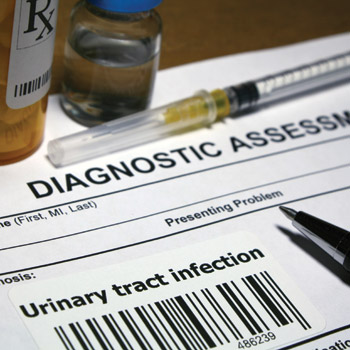Street medicine physicians meet patients where they are
This issue also covers screening for bacteriuria, new thinking about Alzheimer's disease, and communicating ab out migraines.
In medicine's traditional model, the patient comes to the physician, be it in the office, the clinic, or the hospital. Some patients, though, are unable or unwilling to seek out care, especially those who are homeless. For them, street medicine reverses the patient-physician dynamic, bringing the physician to the patient. Programs in this model have been growing across the country, including the advent of a new street medicine fellowship beginning this month in Pittsburgh. Senior Writer Mollie Durkin talks to physicians from programs nationwide for an in-depth look at what street medicine is, why it's important, and how to provide it.
Physicians are primed to prescribe treatment after a positive test result, so when a urine culture comes back positive, antibiotics may seem like the best answer. Concerns about resistance, however, have led some experts to counsel caution when managing asymptomatic bacteriuria. The Infectious Diseases Society of America, for example, recommends against routine screening and treatment in most cases, while the American Geriatrics Society includes avoiding antibiotics in asymptomatic older adults in its Choosing Wisely guidance. Our story reviews the evidence on screening and treatment of asymptomatic bacteriuria and UTIs, along with current views on best practice.
Cognitive impairment used to be a fairly narrow category, with patients divided into those with dementia and those without, but new research and technology have led to a more nuanced spectrum of diagnosis, one expert explained at the American Academy of Neurology's 2019 annual meeting. Read our story to learn more, including an update on how new imaging methods are affecting diagnosis of Alzheimer's disease. Another story from the American Academy of Neurology's meeting addresses migraines, specifically why communication may be the biggest key to effective treatment. A neurologist and a psychologist review the importance of gathering data, following up on patients' headache diaries, and providing thorough, detailed patient education.
In additional conference coverage, a story from the American Thoracic Society's 2019 annual meeting looks at the rise of e-cigarettes and some of the reasons why this should in turn raise physicians' concerns. For example, e-cigarette flavorings are generally considered safe to eat, but that doesn't mean they're safe to inhale, one expert said, detailing early research showing potential negative biological effects. And last but certainly not least, our coverage of this year's Leadership Day saw nearly 400 physicians and medical students visiting Washington, D.C., to discuss health care priorities with their elected representatives.
How do you address UTIs and cognitive impairment in your practice? Let us know, and send us any other comments on this issue, at immatters@acponline.org.
Sincerely,
Jennifer Kearney-Strouse
Executive Editor




